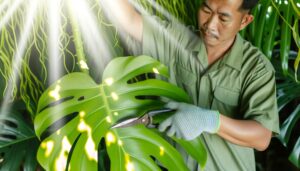Do Monstera Plants Attract Bugs? Prevention and Care Tips!
Yes, Monstera plants do attract pests such as spider mites, scale insects, and fungus gnats. You should regularly inspect your plant for signs like yellowing leaves, webbing, or sticky residue.
Maintaining ideal growing conditions, including consistent soil moisture and balanced fertilization, can help minimize pest problems. Implement natural pest control methods, like introducing beneficial insects, or use low-impact treatments such as neem oil.
Avoid synthetic pesticides as they can harm beneficial insects and cause environmental issues. By staying vigilant, you can keep your Monstera healthy and pest-free, ensuring its best growth and essentiality.
Learn the intricacies of effective pest management methods.
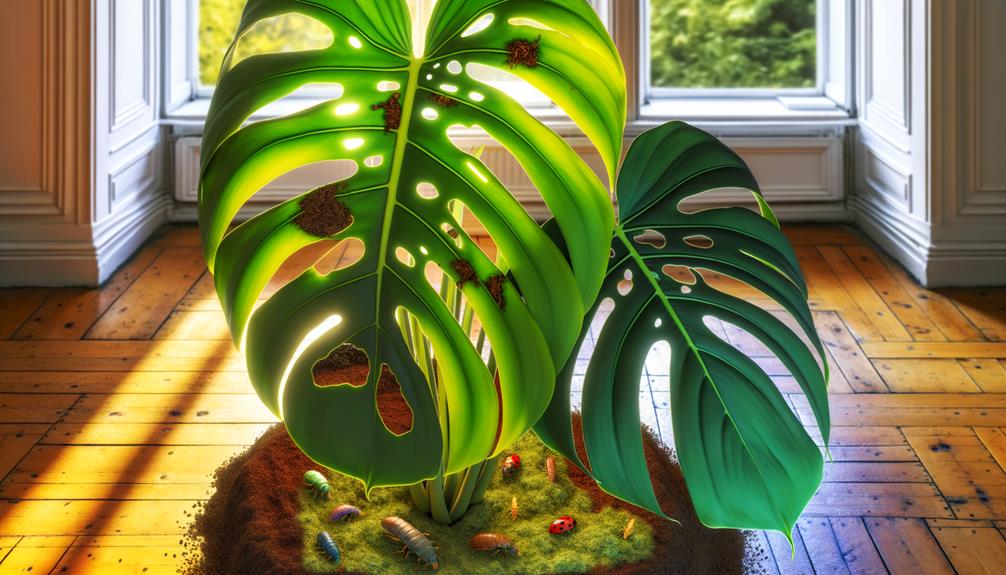
Key Takeaways
- Monstera plants can attract pests such as spider mites, scale insects, and fungus gnats.
- Regular inspections are crucial to detect and manage pest infestations early.
- Maintaining consistent soil moisture and hygiene helps reduce the likelihood of pests.
- Beneficial insects like ladybugs can naturally control pest populations on Monstera plants.
- Using organic pest control methods minimizes environmental impact and protects plant health.
Common Pests on Monstera
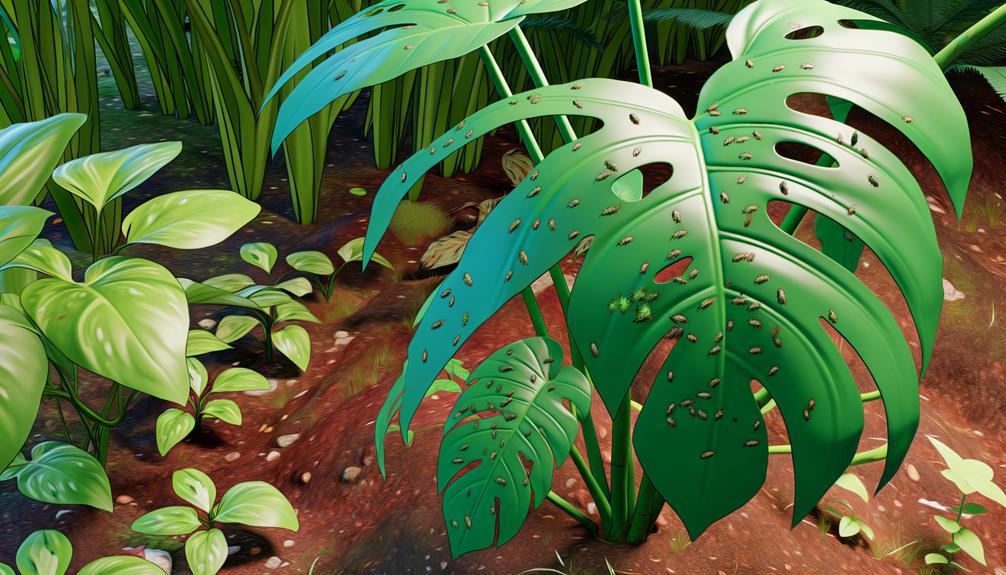
Monstera plants, though generally resilient, can fall victim to a variety of common pests including spider mites, scale insects, and fungus gnats. Spider mites are microscopic arachnids that puncture plant cells to feed, causing stippling and potential leaf loss. Scale insects, identifiable by their shield-like coverings, secrete honeydew that fosters sooty mold growth, undermining photosynthesis.
Fungus gnats, attracted to damp soil, lay eggs that hatch into larvae, which then feed on roots and organic matter, stunting plant growth. Effective pest management requires understanding each pest’s lifecycle and behavior. For instance, spider mites thrive in dry conditions; hence, increasing humidity can mitigate infestations.
Regularly inspecting your Monstera and maintaining ideal growing conditions are essential preventive measures against these pests.
Signs of Pest Infestation
Detecting pest infestations early is essential, so look for telltale signs such as yellowing leaves, webbing on the undersides of foliage, or a sticky residue that indicates honeydew secretion. Examine your Monstera closely for tiny insects like spider mites, which create fine webbing, or aphids, which leave a sticky residue known as honeydew.
Yellowing leaves can be a symptom of root mealybugs, which reside in the soil and attack roots. Additionally, check for distorted, curling, or stunted growth, as these can signal the presence of pests such as thrips or scale insects. Observe for any unusual patterns on the leaves, like speckling or stippling, indicative of mite damage.
Regular, meticulous inspections will help you identify and address pest problems promptly.
Preventative Measures
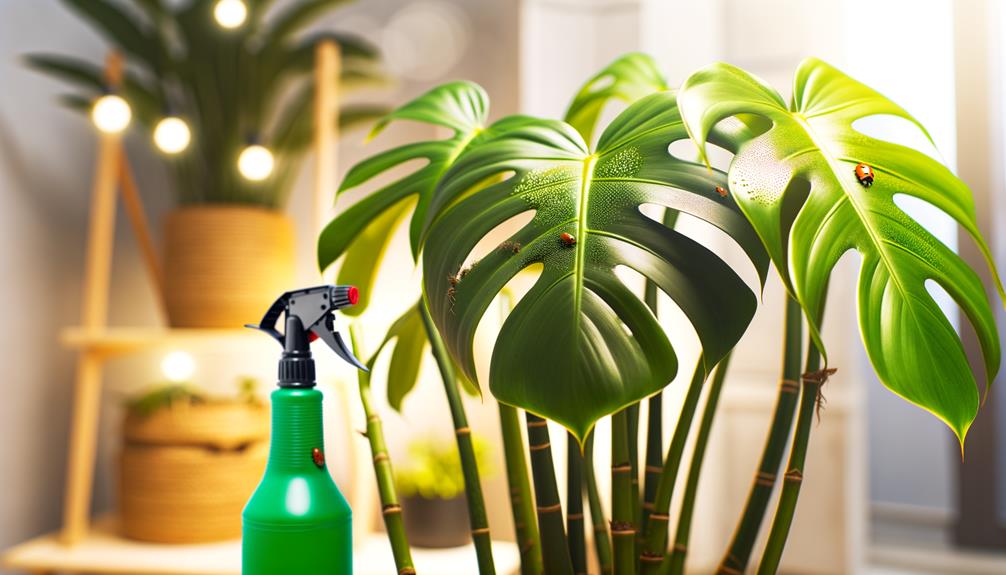
To reduce pest infestations, implement a strict cleaning routine by regularly wiping down Monstera leaves with a damp cloth to remove dust and potential pests.
Maintain consistent soil moisture without overwatering to promote healthy plant growth, as excessively damp conditions attract harmful insects.
Incorporating these preventive measures will greatly decrease pest-related problems and support robust plant development.
Regular Cleaning Routine
Maintaining a regular cleaning routine for your Monstera plants, including wiping down leaves with a damp cloth and inspecting for pests, is essential for preventing infestations and guaranteeing peak plant health. By removing dust and debris, you enhance the plant’s ability to photosynthesize efficiently. Utilize a soft, lint-free cloth to avoid damaging the foliage.
Regular inspection aids in early detection of pests such as spider mites and scale insects. If you spot any, employ neem oil or insecticidal soap as an immediate countermeasure. Consistent cleaning minimizes the likelihood of pest colonization by disrupting their habitat.
Additionally, it promotes better air circulation around the leaves, reducing humidity levels that could otherwise attract unwanted insects. This meticulous approach assures your Monstera remains robust and vibrant.
Proper Watering Techniques
In addition to regular cleaning, mastering proper watering techniques is crucial for thwarting potential pest invasions and safeguarding the overall health of your Monstera plants. Over-watering can create a conducive environment for pests like fungus gnats, while under-watering stresses the plant, making it vulnerable to infestations.
Follow these expert tips:
- Soil Moisture Monitoring: Use a moisture meter to verify the soil is adequately moist but not waterlogged.
- Drainage: Guarantee pots have proper drainage holes to prevent water accumulation.
- Watering Schedule: Water your Monstera only when the top inch of soil feels dry.
- Water Quality: Use filtered or rainwater to avoid chemicals that could damage the plant’s root system.
These steps will help maintain a healthy, pest-free environment for your Monstera.
Natural Pest Control Methods
One effective natural pest control method for Monstera plants involves introducing beneficial insects like ladybugs and predatory mites to target and eliminate harmful pests. These beneficial insects are natural predators of common Monstera pests such as aphids, spider mites, and whiteflies. By releasing them into your plant environment, you establish a biological control system that minimizes pest populations without chemical intervention.
Ladybugs, for instance, can consume hundreds of aphids daily, while predatory mites target various mite species. Additionally, maintaining healthy plant hygiene through regular pruning and debris removal further supports this ecological balance.
Employing these natural methods ensures a strong defense against pests, promoting the overall health and importance of your Monstera plants.
Chemical Treatments
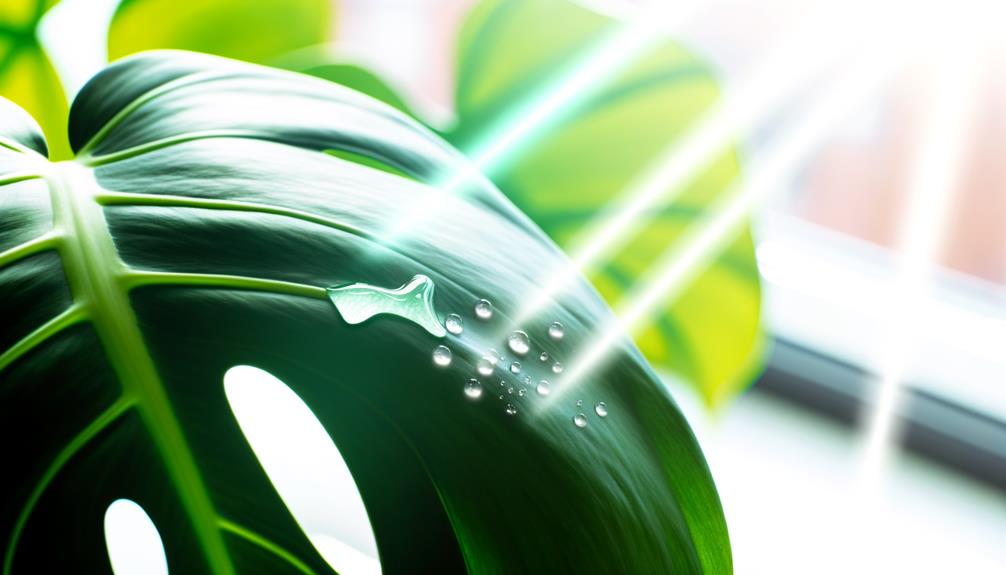
When addressing pest infestations on your Monstera, you’ll need to contemplate different treatment options. Chemical treatments like insecticidal soap applications can be effective as they disrupt the insect’s cell membranes. Neem oil is another option that offers a dual-action benefit; it acts as both a repellent and a growth inhibitor for various pests. However, it is crucial to be cautious with synthetic pesticides due to their potential phytotoxicity and adverse environmental impact.
Insecticidal Soap Applications
To effectively combat pests on Monstera plants, applying insecticidal soap provides a targeted chemical treatment that disrupts the insects’ cell membranes, leading to their dehydration and eventual death. This method guarantees the pests are eradicated without causing harm to the plant.
When using insecticidal soap, consider the following steps:
- Dilution: Follow the manufacturer’s instructions to dilute the soap correctly, avoiding any potential phytotoxicity.
- Application: Spray the solution evenly on all plant surfaces, focusing on the undersides of leaves where pests typically reside.
- Frequency: Apply the treatment every 7-10 days until you no longer observe any pest activity.
- Safety: Wear protective gloves and avoid spraying during high temperatures to prevent plant damage.
Implementing these steps maximizes the effectiveness of insecticidal soap and safeguards your Monstera.
Neem Oil Benefits
Neem oil, obtained from the seeds of the neem tree, offers a multifaceted approach to pest control by acting as both a repellent and an insect growth regulator, making it an indispensable tool in managing Monstera plant pests.
When you apply neem oil, its active compound, azadirachtin, disrupts the hormonal systems of insects, preventing molting and reproduction. This effectively reduces pest populations over time. Additionally, the oil coats the insects, suffocating them and acting as an immediate deterrent.
You can also use neem oil as a preventative measure; its residual effects continue to repel pests long after application. For best results, apply it evenly on all plant surfaces, ensuring thorough coverage.
Neem oil’s eco-friendly profile also supports sustainable pest management practices.
Synthetic Pesticide Risks
While neem oil offers a natural solution for Monstera plant pests, synthetic pesticides present significant risks that must be carefully considered. These chemical treatments can negatively impact not only your plant but also your health and environment.
Consider the following risks:
- Toxicity:
Synthetic pesticides often contain harmful chemicals that can be toxic to humans and pets.
- Environmental Damage:
Runoff can contaminate water sources, harming aquatic life and disrupting ecosystems.
- Resistance:
Pests can develop resistance to synthetic treatments, rendering them less effective over time.
- Residual Impact:
Chemicals can persist in the soil, affecting future plantings and beneficial insects.
Opting for synthetic pesticides might seem convenient, but understanding these risks guarantees you’re making an informed decision.
Maintaining Plant Health
Maintaining peak health for your Monstera involves regular monitoring for pests, nutrient imbalances, and environmental stressors. Vigilance is key; inspect leaves for signs of pests like spider mites or scale insects, which often inhabit the undersides. These pests can be managed using neem oil or insecticidal soap.
Assess soil moisture levels to prevent root rot, guaranteeing the substrate remains well-draining. Balanced fertilization is crucial; use a diluted, balanced liquid fertilizer during the growing season to avoid nutrient deficiencies.
Conclusion
To sum up, your Monstera plant can attract pests if you’re not vigilant. By recognizing signs of infestation early, employing preventative measures, and using both natural and chemical treatments, you can keep your plant healthy.
Think of pest control like a game of chess; anticipating your opponent’s moves will help you checkmate any potential threats.
With expert care, your Monstera will thrive, turning your space into a lush, bug-free oasis.




